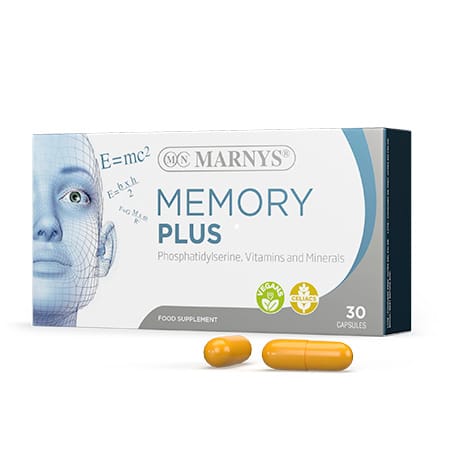Description
Information about MARNYS Memory Plus, 30 capsules
Memory Plus Capsules is a food supplement specially designed for young adults who want to contribute to mental performance, especially during periods of intense intellectual effort (study or exams, work stress) , as well as adults who want to contribute to the normal functioning of the nervous system and cognitive function (e.g. concentration) .
Properties of the ingredients of Memory Plus Capsules
🔹B complex vitamins
B complex vitamins (thiamine, riboflavin, niacin) contribute to normal energy metabolism, normal mental performance, and the reduction of fatigue and tiredness ( EFSA ).
🔹Choline and Phosphatidylserine
Choline and Phosphatidylserine are essential components in the structure of neurons . Memory Plus Capsules contain Choline in citrate form .
🔹Zinc
Zinc contributes to normal acid-base and fatty acid metabolism, and to the maintenance of vision ( EFSA ).
🔹Chrome
Chromium contributes to the maintenance of normal blood glucose levels ( EFSA ).
🔹Selenium and vitamin C and E
Selenium and vitamins C and E contribute to the protection of the cell from oxidative damage ( EFSA ).
🔹Betacarotenes (ß-carotenes) and vitamin A
ß-carotenes that are equivalent to 50% of the NRV of vitamin A, which are pigments found in plants, such as carrots, and are excellent precursor sources of vitamin A.
Who is Memory Plus Capsules recommended for?
Memory Plus Capsules are ideal for young adults who want to contribute to mental performance , especially during periods of intense intellectual effort (study or exams, work stress), and adults who want to contribute to the normal functioning of the nervous system and cognitive function (for example , concentration ).
Advantages of Memory Plus Capsules
✓ Suitable for vegans.
✓ Vegetable capsules.
To Know More
Vitamins that promote memory and concentration
To fulfill these functions and others, our brain demands approximately 20% of the energy we ingest through food. Vitamins are an important part of our diet and also participate in proper brain functioning, especially concentration and memory .
Group B vitamins, importance in brain function
The general metabolic functions of B vitamins have a favorable impact on brain function. Likewise, group B vitamins participate in cellular repair, including DNA, in the production of neurotransmitters and other neurological molecules of importance for cognitive function. The importance of these vitamins at the brain level is so great that, although the turnover rate of B vitamins can reach up to 100%, their levels are closely regulated by multiple mechanisms in the brain.
Let’s look at two B vitamins and how they participate in brain function.
- Thiamine (B1) : it is key for the production of fatty acids, steroids, amino acids and nucleic acids that are part of neuronal structures and neurotransmitters, such as acetylcholine. It also intervenes in the communication between the nervous system and other systems such as the muscular system, as well as in cellular maintenance.
- Niacin (B3) : participates in metabolism and DNA repair, regulates cellular activity, and the conversion of folate into its active derivatives for brain function.
Vitamin C and neuronal protection
Vitamin C is involved in the production of neurotransmitters (GABA and dopamine) and hormones; It also participates in the formation of catecholamines: norepinephrine and adrenaline. Its antioxidant property facilitates the protection of neurons and myelin.
Vitamins A and E, in the cellular structure
Vitamin A and vitamin E exert antioxidant protection by maintaining cellular structure , and vitamin A is key to the vision process.
A varied and balanced diet, with foods rich in nutrients such as fruits, vegetables and dairy products, is capable of providing the amounts of key vitamins and minerals for brain function . Sometimes this diet can be complemented with food supplements that will promote cognitive function.
- Harrison, F.E. et al . Ascorbic Acid and the Brain: Rationale for the Use against Cognitive Decline. 2014.
- Kennedy, D. O. B Vitamins and the Brain: Mechanisms, Dose and Efficacy—A Review. Nutrients. 2016 Feb; 8(2): 68.
- Mikkelsen, K. et al. Cognitive decline: A vitamin B perspective. Maturitas. 2016 Nov;93:108-113.
- Portellano Pérez, J. A. & J. García Alba. Neuropsicología de la atención, la memoria y las funciones ejecutivas. Editorial Síntesis, 2014. ISBN 9788490770269.
- Ruiz-Sánchez de León, J. M. et al. Estudio neuropsicológico de adultos jóvenes con quejas subjetivas de memoria: implicación de las funciones ejecutivas y otra sintomatología frontal asociada. Rev Neurol 2010; 51: 650-60.
- Tanumihardjo, S. A. et al. Biomarkers of Nutrition for Development (BOND)—Vitamin A Review. J Nutr 2016;146(Suppl):1816S–48S.
- Tardy, A-L. et al. Vitamins and Minerals for Energy, Fatigue and Cognition: A Narrative Review of the Biochemical and Clinical Evidence. Nutrients 2020, 12, 228.
- Ulatowski, L. M. & D. Manor. Vitamin E and neurodegeneration. Neurobiology of Disease 84 (2015) 78–83.












Reviews
There are no reviews yet.